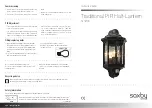
Commissioning
Instruction leaflet
Traditional PIR Half-Lantern
1818PIR
www.saxbylighting.com
For your safety, always switch off the supply before changing lightbulbs, or cleaning.
Waste electrical products should not be disposed of with household waste. Please recycle where facilities exist.
Check with your Local Authority or retailer for recycling advice.
Recycling advice
Safety information
Saxby Lighting Ltd. LS9 0SE
We recommend cleaning with a soft dry cloth.
Do not use solvents or abrasive cleaners as these could
damage the finish.
Glass parts – Wash with warm water or just use a damp
cloth. Do not use abrasive materials as these will damage
the finish.
This bulb is protected by a glass shade. This part must be replaced immediately should the glass
shade become cracked or damaged. This fitting must not be used without the glass shade in place.
• Refit the plastic cover over the terminal block and secure
in place using the screw. Refit the PIR in the slot.
• Refit the front section in place, and refit the screw at the
bottom.
• Replace fuse or circuit breaker and switch on. Your light
is now ready for use.
Iss.3 24082015
• When changing a bulb, always switch off at the mains
and allow the bulb to cool before handling. Dispose of
used bulbs carefully. Do not exceed the wattage stated
or use a different shape bulb from that indicated on the
fitting.
• Do not exceed the wattage stated or use a different shape
bulb from that indicated on the fitting.
• Unscrew the bulb anti clockwise to remove.
• Carefully locate the bulb in the lampholder and turn
clockwise to secure.
Fitting/replacing bulbs
60W E27 GLS
PIR Adjustment:
• The unit must be installed in a vertical position, and fitted
1.8m - 2.5m above the ground.
• The PIR sensor can be adjusted, allowing the detection
distance to be altered to suit the location. The detection
angle is set at 120 degrees. The duration that the lamp
stays on can also be altered from 5 seconds - 5 minutes.
Use a small screwdriver to adjust the ‘TIME’ and
‘SENS’ screws. When adjusting the sensitivity (detection
distance) in daylight it will be necessary to cover the
sensor to simulate night time.




















